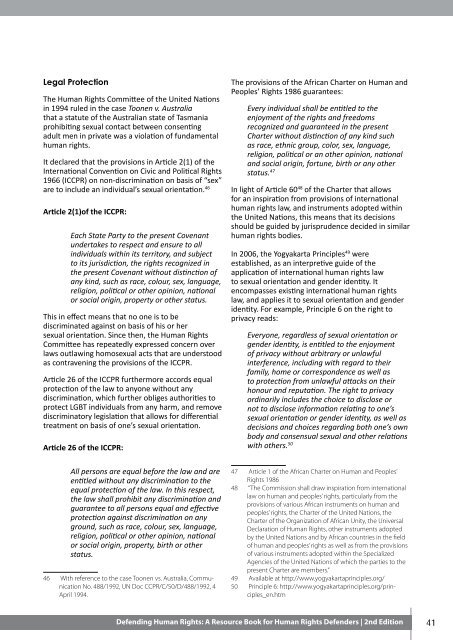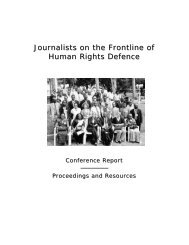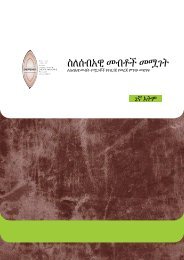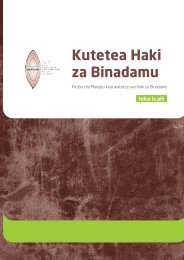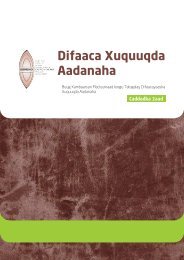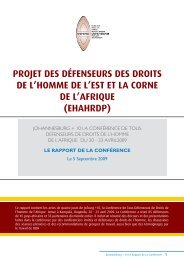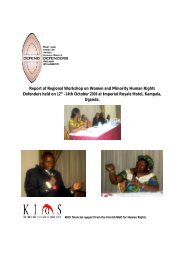Defending Human Rights: A Resource Book for Human
Defending Human Rights: A Resource Book for Human
Defending Human Rights: A Resource Book for Human
Create successful ePaper yourself
Turn your PDF publications into a flip-book with our unique Google optimized e-Paper software.
Legal Protection<br />
The <strong>Human</strong> <strong>Rights</strong> Committee of the United Nations<br />
in 1994 ruled in the case Toonen v. Australia<br />
that a statute of the Australian state of Tasmania<br />
prohibiting sexual contact between consenting<br />
adult men in private was a violation of fundamental<br />
human rights.<br />
It declared that the provisions in Article 2(1) of the<br />
International Convention on Civic and Political <strong>Rights</strong><br />
1966 (ICCPR) on non-discrimination on basis of “sex”<br />
are to include an individual’s sexual orientation. 46<br />
Article 2(1)of the ICCPR:<br />
Each State Party to the present Covenant<br />
undertakes to respect and ensure to all<br />
individuals within its territory, and subject<br />
to its jurisdiction, the rights recognized in<br />
the present Covenant without distinction of<br />
any kind, such as race, colour, sex, language,<br />
religion, political or other opinion, national<br />
or social origin, property or other status.<br />
This in effect means that no one is to be<br />
discriminated against on basis of his or her<br />
sexual orientation. Since then, the <strong>Human</strong> <strong>Rights</strong><br />
Committee has repeatedly expressed concern over<br />
laws outlawing homosexual acts that are understood<br />
as contravening the provisions of the ICCPR.<br />
Article 26 of the ICCPR furthermore accords equal<br />
protection of the law to anyone without any<br />
discrimination, which further obliges authorities to<br />
protect LGBT individuals from any harm, and remove<br />
discriminatory legislation that allows <strong>for</strong> differential<br />
treatment on basis of one’s sexual orientation.<br />
Article 26 of the ICCPR:<br />
The provisions of the African Charter on <strong>Human</strong> and<br />
Peoples’ <strong>Rights</strong> 1986 guarantees:<br />
Every individual shall be entitled to the<br />
enjoyment of the rights and freedoms<br />
recognized and guaranteed in the present<br />
Charter without distinction of any kind such<br />
as race, ethnic group, color, sex, language,<br />
religion, political or an other opinion, national<br />
and social origin, <strong>for</strong>tune, birth or any other<br />
status. 47<br />
In light of Article 60 48 of the Charter that allows<br />
<strong>for</strong> an inspiration from provisions of international<br />
human rights law, and instruments adopted within<br />
the United Nations, this means that its decisions<br />
should be guided by jurisprudence decided in similar<br />
human rights bodies.<br />
In 2006, the Yogyakarta Principles 49 were<br />
established, as an interpretive guide of the<br />
application of international human rights law<br />
to sexual orientation and gender identity. It<br />
encompasses existing international human rights<br />
law, and applies it to sexual orientation and gender<br />
identity. For example, Principle 6 on the right to<br />
privacy reads:<br />
Everyone, regardless of sexual orientation or<br />
gender identity, is entitled to the enjoyment<br />
of privacy without arbitrary or unlawful<br />
interference, including with regard to their<br />
family, home or correspondence as well as<br />
to protection from unlawful attacks on their<br />
honour and reputation. The right to privacy<br />
ordinarily includes the choice to disclose or<br />
not to disclose in<strong>for</strong>mation relating to one’s<br />
sexual orientation or gender identity, as well as<br />
decisions and choices regarding both one’s own<br />
body and consensual sexual and other relations<br />
with others. 50<br />
All persons are equal be<strong>for</strong>e the law and are<br />
entitled without any discrimination to the<br />
equal protection of the law. In this respect,<br />
the law shall prohibit any discrimination and<br />
guarantee to all persons equal and effective<br />
protection against discrimination on any<br />
ground, such as race, colour, sex, language,<br />
religion, political or other opinion, national<br />
or social origin, property, birth or other<br />
status.<br />
46 With reference to the case Toonen vs. Australia, Communication<br />
No. 488/1992, UN Doc CCPR/C/50/D/488/1992, 4<br />
April 1994.<br />
47 Article 1 of the African Charter on <strong>Human</strong> and Peoples’<br />
<strong>Rights</strong> 1986<br />
48 “The Commission shall draw inspiration from international<br />
law on human and peoples’ rights, particularly from the<br />
provisions of various African instruments on human and<br />
peoples’ rights, the Charter of the United Nations, the<br />
Charter of the Organization of African Unity, the Universal<br />
Declaration of <strong>Human</strong> <strong>Rights</strong>, other instruments adopted<br />
by the United Nations and by African countries in the field<br />
of human and peoples’ rights as well as from the provisions<br />
of various instruments adopted within the Specialized<br />
Agencies of the United Nations of which the parties to the<br />
present Charter are members.”<br />
49 Available at http://www.yogyakartaprinciples.org/<br />
50 Principle 6: http://www.yogyakartaprinciples.org/principles_en.htm<br />
<strong>Defending</strong> <strong>Human</strong> <strong>Rights</strong>: A <strong>Resource</strong> <strong>Book</strong> <strong>for</strong> <strong>Human</strong> <strong>Rights</strong> Defenders | 2nd Edition 41


